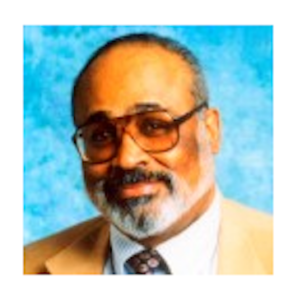
Roger Banks
*Roger Banks was born on this date in 1936. He was a Black educator and Public Policy Activist.
Roger Ware Banks and his brother Robert were born in Albuquerque, New Mexico, to Robert T. Banks and Violet Houston Banks. After graduating from Carver High School in Phoenix, Arizona, 1954, he joined the U.S. Army. In 1958, after completing his military service, Banks earned a BA and MA degrees in History and Political Science at the University of New Mexico, where he was a member of the Phi Kappa Phi National Honor Society, the National Student Association, and a fellow in NASA's Program for the Advanced Study of Public Science Policy and Administration.
While an undergraduate, he was active in the American Civil Rights movement. In 1959, he conducted a housing discrimination research project for the University of New Mexico, and in 1960 conducted the nation's first statewide Public Accommodations Survey. Banks stated that both projects were done with the purpose of "proactively developing legislation/ policy and changing systemic and individual behavior."
Banks served as a Peace Corps volunteer in Punjab, India, from 1963 to 1965. Banks held positions with the New Mexico Peace Corps and VISTA Training Center, 1965-1968; the Economic Opportunity Board of Bernalillo County, New Mexico (U.S. Office of Economic Opportunity), 1965-1969; and the New Mexico Intergovernmental Seminar for Government Executives from 1969-1970.
Upon moving north, he completed coursework for a Ph.D. in Political Science at the University of Minnesota while receiving an NIMH grant for the Study of Policy Evaluation and Methodology and as an American Political Science Association Black Fellow. During this time, he married Caroline Giles; they later divorced.
From 1974- 2000, Banks taught courses in American public policy, ethnic politics, and cultural competency, among other subjects, for the Afro American and African Studies and Political Science Departments at the University of Minnesota. He also taught at the Political Science Department at Macalester College and the Center for Non-Profit Management at the University of Saint Thomas.
Banks served on many committees and boards, including the Junior League of Minneapolis, Minnesota Visiting Nurse Agency; Minneapolis Area United Way; Minnesota Department of Health's Advisory Group on Race and Ethnicity, Office of Minority Health; Minnesota Council on Black Aging; Minneapolis Neighborhood Revitalization Program; Minnesota Parenting Association; Minnesota Elders Coalition, ELDERS Senior Center; Minnesota Department of Planning; Urban Communities Association of Minneapolis; Salvation Army; the 1995 White House Conference on Aging, Minnesota, and Washington, D.C.; among others.
In 1971, he was a delegate to every city, county, and state DFL Party convention. He was a delegate in 1975 and 1979 to the National Democratic Party conventions on Policy and Party Organizations and is listed in Who's Who in American Politics. For almost 50 years, Roger designed, developed, implemented, and evaluated numerous programs and initiatives to reduce disparities experienced by populations of color and the poor. Banks held positions with the Minneapolis Area United Way, 1979-1993; the Minneapolis Urban League, 1993-1996; the Children's Initiative of St. Paul/Ramsey County, 1996-2000; and the State of Minnesota Council on Black Minnesotans, 2002-2012.
In 2006, he received the Franklin H. Williams Award in Washington, D.C., one of eleven returned Peace Corps volunteers who made careers of giving back to their communities. According to the official press release, "The award honors Peace Corps volunteers of color who continue the Peace Corps mission through their commitment to community service and who support the agency's...goal of promoting a better understanding of other peoples on the part of Americans."
Roger Banks died on October 18, 2012, in Minneapolis. He was 76. His family and friends remember him for his gentle, generous, steadfast spirit, critical intellect, and love of ethnic foods, music, and arts.